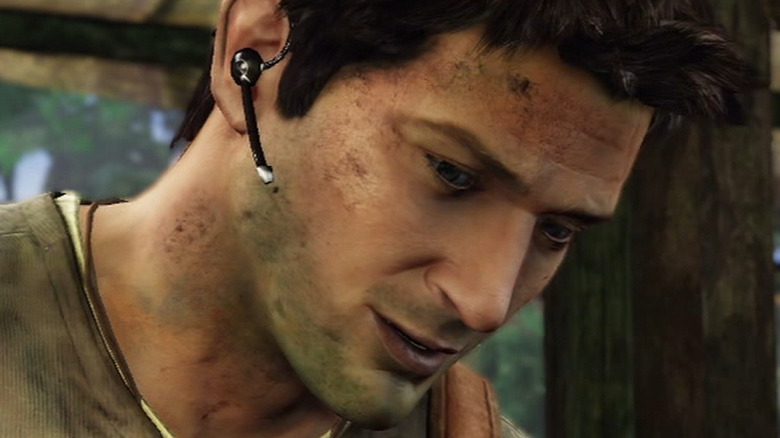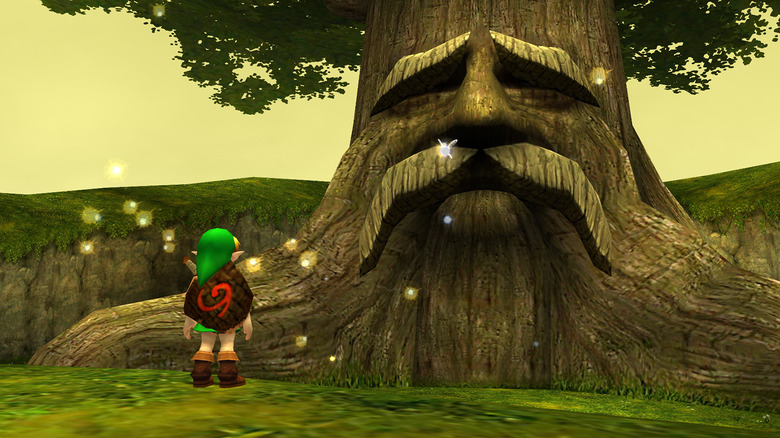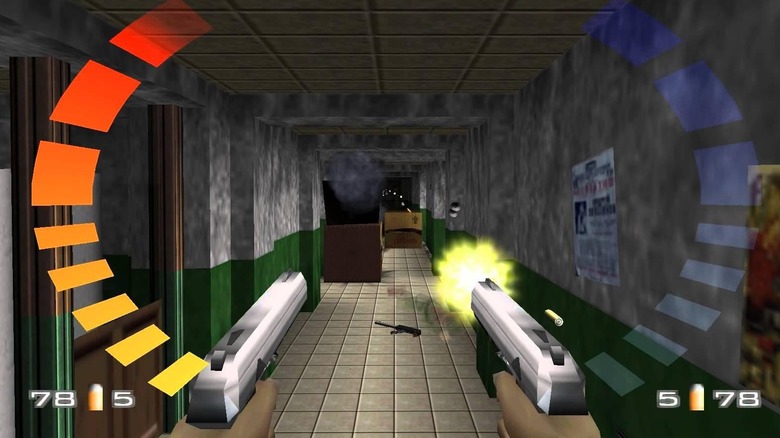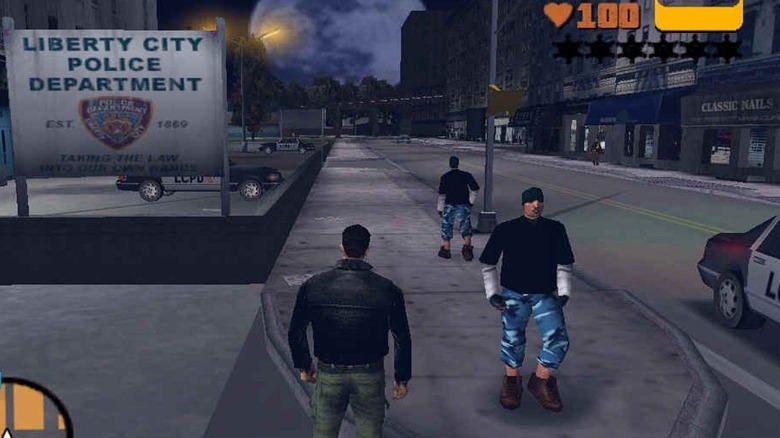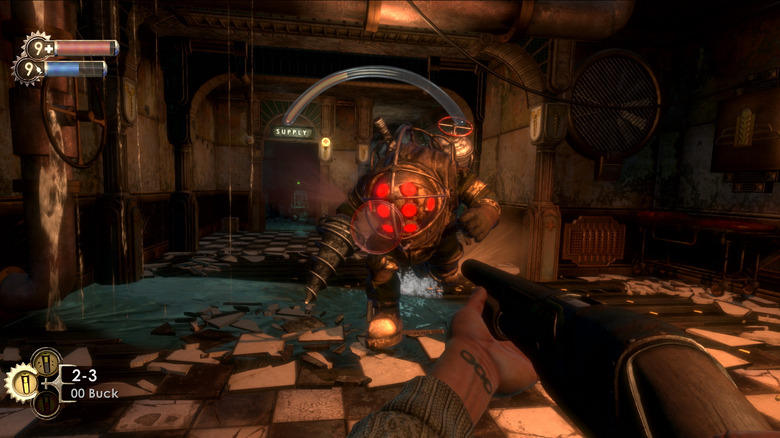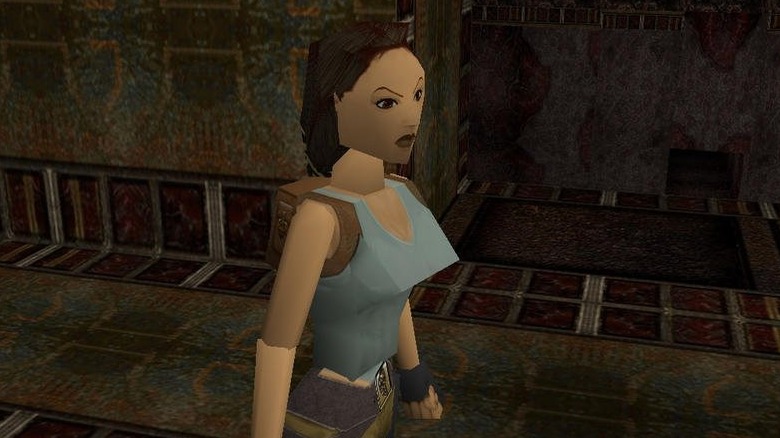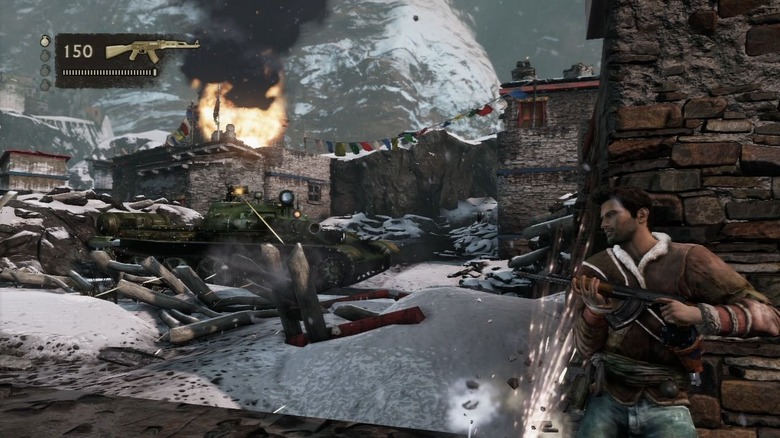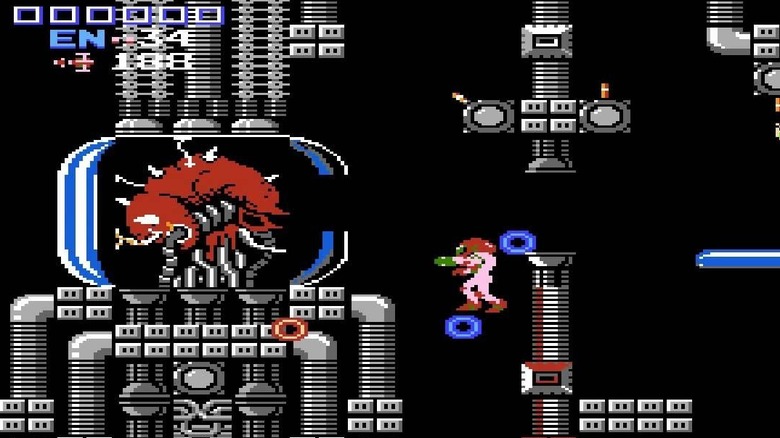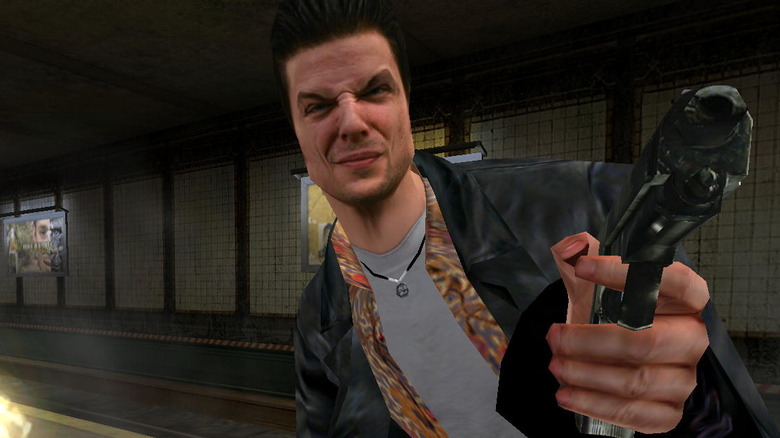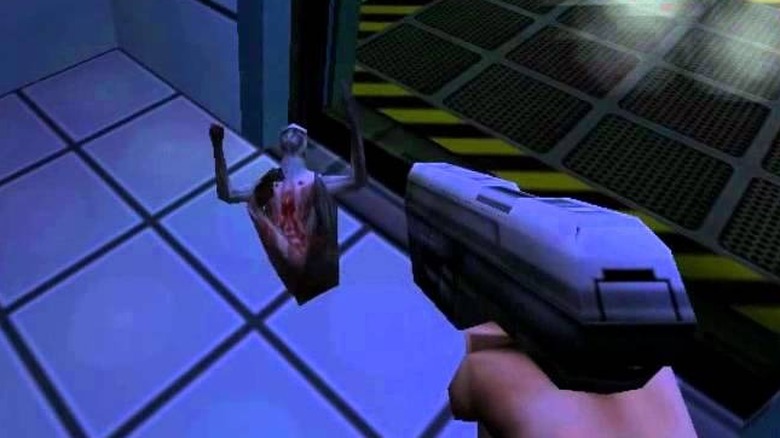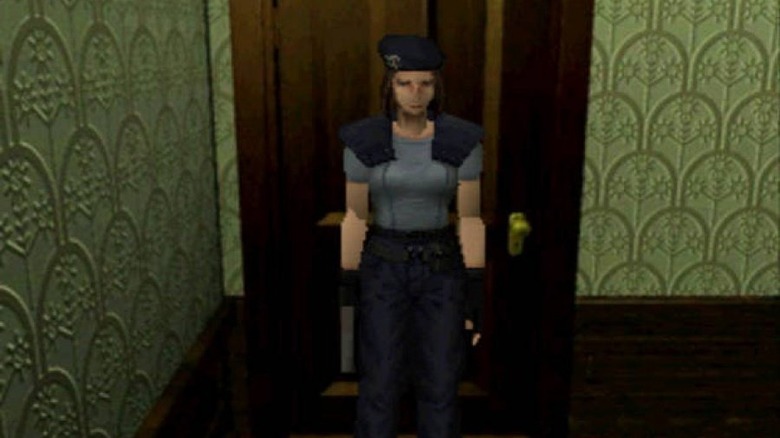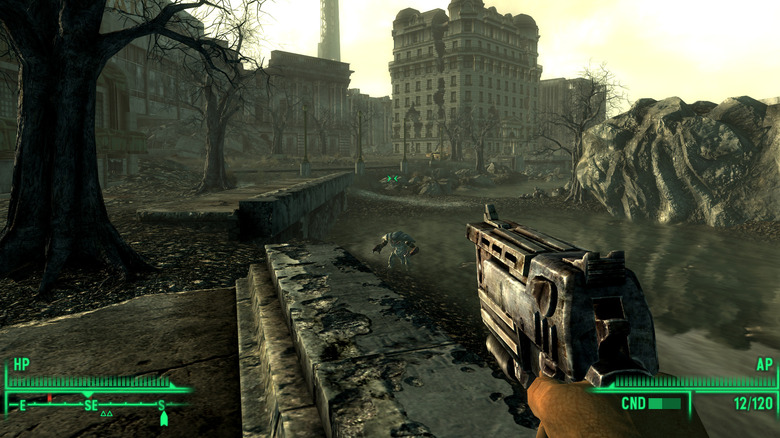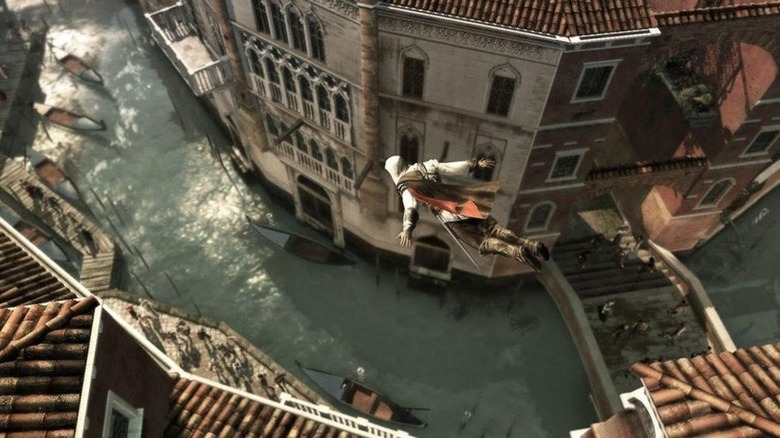'Best Games Of All Time' That Have Aged Poorly
Compared to any other entertainment medium, video games have evolved rapidly. Players are conditioned to expect better graphics, smoother frame rates, and more advanced systems with each new generation of games. Many games that were once heralded as the best of all time are starting to show their age.
Let's get this out of the way up top: This is not a list of bad games. In fact, most of these are still worth playing — albeit with the help of official remasters, remakes, or fan mods. Still, the conveniences of modern video games can make it tough to revisit these classics, especially without the rose-tinted glasses of nostalgia. Whether it be from awkward controls or writing that is very much of its era, playing these titles today doesn't hold the same spectacle as when they were first released. Here are some of the best games of all time that have aged poorly.
The Legend of Zelda: Ocarina of Time
Sorry to burst your bubble. Call it a "masterpiece" or the best "Zelda" game of all time, but go hook up your N64, then give that controller to someone who plays games today and tell them to go wild. They won't last an hour.
The truth is that "Ocarina of Time" was a revolutionary game for its time and is still very much worth playing. It set the template for the next 25 years of action-adventure games, but that is the primary reason it doesn't hold up as one of the best games of all time. From its early attempts at a pseudo-open world to the infamous Z-targeting combat, the elements of "Ocarina" that defined it have been iterated on for decades now. Most of the dungeon design holds up (aside from the Water Temple and some other clunky spots), but the camera, especially in the original release, is a relic of a different age. Critically acclaimed modern masterpieces like "God of War" or "Dark Souls" owe a lot to the first 3D "Zelda," but our advice? Just play those games instead. Today, more modern rankings of the series will commonly place "Breath of the Wild," "A Link to the Past" and even the (at the time) controversial direct sequel "Majora's Mask" above the N64 classic.
GoldenEye 007
Not to hate exclusively on the N64, but the early 3D era of gaming is definitely the worst victim of aging in the history of the medium. Early shooters have it especially rough, and "GoldenEye 007" is a prime example. The 1997 game was the defining couch multiplayer game for a generation of players and as recently as 2016 was still being heralded as one of the best to ever exist. While it may be the best James Bond video game, it simply isn't very fun by today's standards.
Ahead of its time as it was, "GoldenEye 007" doesn't have controls that feel good or natural anymore. The mission design has aged (escort missions are extremely out of vogue these days) and for a game that was known for its multiplayer, it is not well-balanced. Everyone knew picking Oddjob was unfair, but this was before the days of devs being able to just drop a balance patch, so players had to simply tell their friends to not pick him. That fact makes for a bit of charming nostalgia, but it does not make "GoldenEye" a game worth revisiting.
Now that the line between console and PC games isn't as thick anymore, fans tend to agree that, even at the time, "GoldenEye" was inferior to its PC contemporaries.
Grand Theft Auto 3
Not taking into account the massively disappointing "Definitive Edition" remasters, "Grand Theft Auto 3" isn't really worth playing in 2021. Even diehard fans agree the PS2 era of "GTA" doesn't quite hold up. The groundbreaking open world of "GTA 3" changed the game, pun intended, forever. Looking back, is being ahead of its time enough to justify playing through the entire 20-hour story?
Obviously, open worlds like Rockstar's own "Red Dead Redemption 2" have come a long way since "GTA 3" in terms of both interactivity and fidelity, but that's not exactly a fair comparison. What has aged worst is the shooting and mission design. The missions are simplistic and restrictive compared to modern sandbox games — and some critics even argue that Rockstar's mission design hasn't evolved much since.
What's aged most poorly is the writing. The mean-spirited satire of "Grand Theft Auto" was revolutionary for a time when games didn't have much to say, but was it ever good satire? On top of that, the game is filled with stereotypes that are just cringe-worthy years later.
BioShock
Would you kindly not get upset until you read this whole entry? "BioShock" deserves much of its praise. It has an astoundingly good opening hour, and Rapture still oozes atmosphere making it one of the most exciting destinations in all of gaming. However, people tend to forget that the original "BioShock" is overly long and falls apart completely by the end of its 12-15 hour run time.
You can trace "are games art?" discourse back to the ambitious release of "BioShock" in 2007, but truthfully the story doesn't hold up. The big twist two-thirds of the way through the game was mind-blowing for the time, but it isn't really asking any new questions. It doesn't help that the final third builds to a disappointing boss fight, all while doubling down on the clunky combat and emphasis on scrounging through every trash can for healing items and ammo. "BioShock" is a masterwork of atmosphere and environmental storytelling, but the overly-long and mechanically unsatisfying shooter has aged poorly.
Tomb Raider (1996)
This crypt-crawling action-adventure series has been one of the most influential in gaming. If you are going to start diving in now, though, how about you don't try and go back to the PS1 (and Sega Saturn) original? The tank controls and platforming are unforgiving and incredibly demanding. Modern players used to the newer entries in the series or other 3D platformers are going to constantly miss jumps and have to retry sections to the point of frustration. Unless you grew up playing this one, the gameplay is probably not going to click with you.
"Tomb Raider" might not be as good as you remember, but you don't have to go looking for validation in the comments section. This game has quite the legion of dedicated fans, and that doesn't necessarily mean just angry commenters, either. Fan mods and fixes make the original PC version a lot more playable, so at the very least contemporary gamers can enjoy a piece of history.
Uncharted 2: Among Thieves
Speaking of "Tomb Raider," we naturally have to arrive at its spiritual successor, "Uncharted." These games attempted to capture the magic of "Indiana Jones" and largely succeeded in making gorgeous, globe-trotting adventures. The first "Uncharted" was an impressive PS3 launch game, and its sequel, "Uncharted 2: Among Thieves" racked up GOTY awards like nobody's business. In retrospect, it's a flawed, uneven experience.
The presentational elements of "Uncharted 2" still hold up. The voice-acting is phenomenal and the characters are well-realized, if just a bit shallow. Set piece moments like the train sequence are still technically impressive a decade on. However, playing "Uncharted 2" is a slog. The over-reliance on combat and bullet-sponge enemies make for a frustrating time. The platforming is less involved than even the original "Tomb Raider," and the game is linear and repetitive compared to even Naughty Dog's more recent titles. Some players might find it worth going through to see the story (as goofy as it gets), but "Uncharted 2" definitely doesn't hold up as a gold standard of gaming anymore.
Metroid
The original "Metroid" is an old game, so of course it doesn't totally hold up, but hear us out. If you revisit the NES library, you'll find that many of the system's classics are still great. "The Legend of Zelda" and the original "Super Mario" hold up surprisingly well. Even difficult games like "Castlevania" and "Mike Tyson's Punch-Out!!" are still fun thanks to modern tools like Nintendo Switch Online's rewind feature. But Nintendo's early attempt at an open interconnected map is obtuse by today's standards.
Play it today and you'll find "Metroid" is directionless and almost indecipherable. While the ideas were obviously solid enough to be the foundation of an entire portmanteau'd genre, the language of Metroidvanias was yet to be established. Nowadays, the game ranks low compared to the plethora of incredible sequels it spawned. If you really want to go back to the beginning of the "Metroid" timeline, the excellent "Zero Mission" remake is a better place to start.
Max Payne
The original "Max Payne" was once heralded as an all-time great, taking the (at the time very trendy) bullet time mechanic from "The Matrix" and mashing it up with a film noir story. The result has sadly not aged super well, especially if you're playing the frame-y PS2 port. How much the gameplay has aged depends on who you talk to. Mechanically, "Max Payne" is still a solid shooter that has plenty of defenders, but even they agree that the game's strength is not its story.
Playing it on Xbox today, it's clear to see Remedy's lead writer Sam Lake was still very much figuring out his style. For a studio now known for its world-building in games like "Control" and "Alan Wake," this is disappointing. The story walks the line between parody and cliché and just comes across as an overly edgy attempt at doing something mature. The comic-inspired cutscenes are full of misogynistic noir tropes and a tone that doesn't know how seriously to take the murder of Max's family. Oh, and the two dream sequences where you have to carefully navigate invisible platforms? Yeah, those are still the worst.
System Shock 2
Arriving a year after "Thief: The Dark Project" and a year before "Deus Ex" lit the PC gaming world on fire, "System Shock 2" was part of a wave of games that ushered immersive high-concept RPGs into popularity. The genre started to gain steam in the early '90s with the "Ultima" games, but the "Thief" and "Shock" series made huge strides in expanding the genre to a wider audience. Unfortunately, like "BioShock", 1999's "System Shock 2" hasn't quite held up. There's two main reasons for this.
It's easy to hand wave the poor gameplay, but the other reasons the game doesn't hold up are more essential to its identity. For one, "System Shock 2" has a confusing tutorial segment up front that doesn't communicate the difference between classes or what the game is about in terms of exploration. The bad first impression is complemented by a game that drags in the story department, especially when the big twist only happens after about a third of the playtime
Resident Evil (1996)
Like "Metroid" the original "Resident Evil" is a victim of both iteration over the course of the series and a stellar remake. Still one of the best "Resident Evil" games, 2002's "REmake" makes the original obsolete to anyone barring game historians and franchise completionists.
In 1996, "Resident Evil" was a groundbreaking title that gave birth to a new genre. It established the tank-controls and fixed camera that would define the genre for the next decade and a half. But to many modern gamers, those controls feel outdated. Some moments are still thrilling, but most of the scares don't work due to the dated visuals. Even tank-control stans can admit the voice-acting and translation of the script feel amateurish, despite gracing us with such amazing memes as "Jill sandwich." It is far from the worst in the series, but maybe it's worth considering playing some of the other entries first. Just stay away from the atrocious PC version.
Fallout 3
"Fallout 3" is a pretty darn good game. But even at the time of its release, this massive game aiming (and succeeding) to reboot the franchise shared the flaws of Bethesda's open-world "Elder Scrolls" games before it. Naturally, they haven't all aged especially well, but "Fallout 3" is especially no longer worthy of the RPG hall of fame for some specific reasons.
For starters, going back to "Fallout 3" means returning to the drab wasteland of 2008, an era where it wasn't a huge problem for games to have a mostly gray palette. "Fallout 3" is visually dull and that dullness carries over to the game's shooting and storytelling. The side quests still stand out as some of the best in the genre, but the main storyline is unsatisfying and more-or-less an excuse to explore the world. The game doesn't offer as many morally complex choices and branching paths as its successor, "New Vegas."
Even though "Fallout 4" failed to live up to many fans expectations, it admittedly improved upon some aspects of the third mainline entry, particularly the combat. Also, let's not forget how much depth "Fallout 4" gave to the companion characters. Fawkes doesn't hold a candle to Nick Valentine or Paladin Danse.
Assassin's Creed 2
Once a paragon of open-world design, "Ubisoft open world" has now become shorthand for overwhelming map icons and fatiguing repetition. A major player that established this formula was "Assassin's Creed 2," the sequel to the now-maligned original historical fiction murder simulator. Without it, the franchise wouldn't have gone on to be one of Ubisoft's biggest, its design seeping into all the company's other projects. Looking back on it, was this really a good thing?
Many fans agree that "AC2" hasn't quite aged like the fine wines of Italy. The uninvolved combat and prevalence of finicky sneaking missions make it frustrating by today's standards. Additionally, the once praised revenge story feels generic compared to, say, "Assassin's Creed: Origins." Ezio was once a gaming icon, but he and the other characters don't have a whole lot of depth or nuance. And let's not forget that a big chunk of the story was yanked out and turned into DLC so the game could ship on time. In retrospect, this was the start of a worrisome trend.

